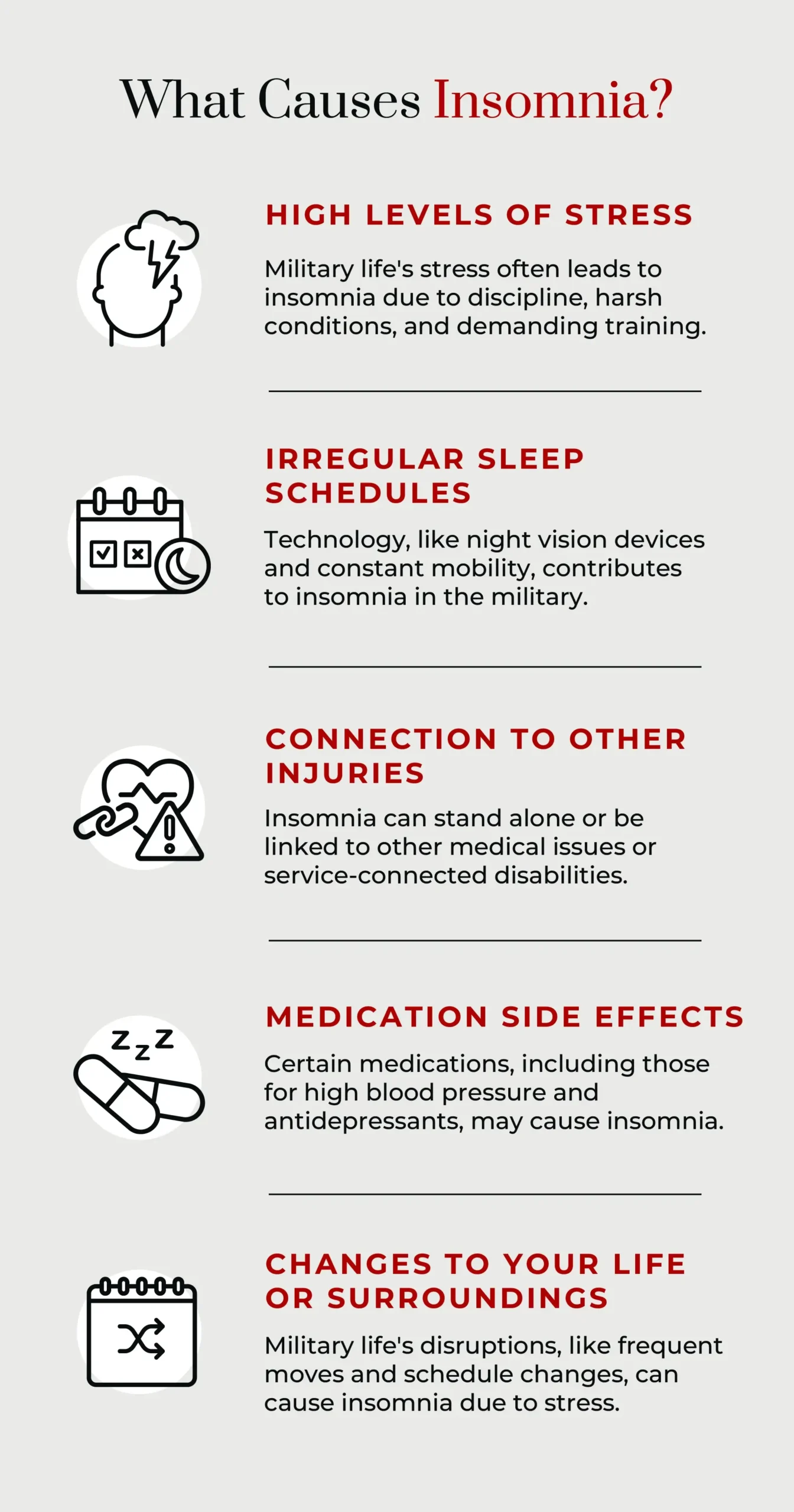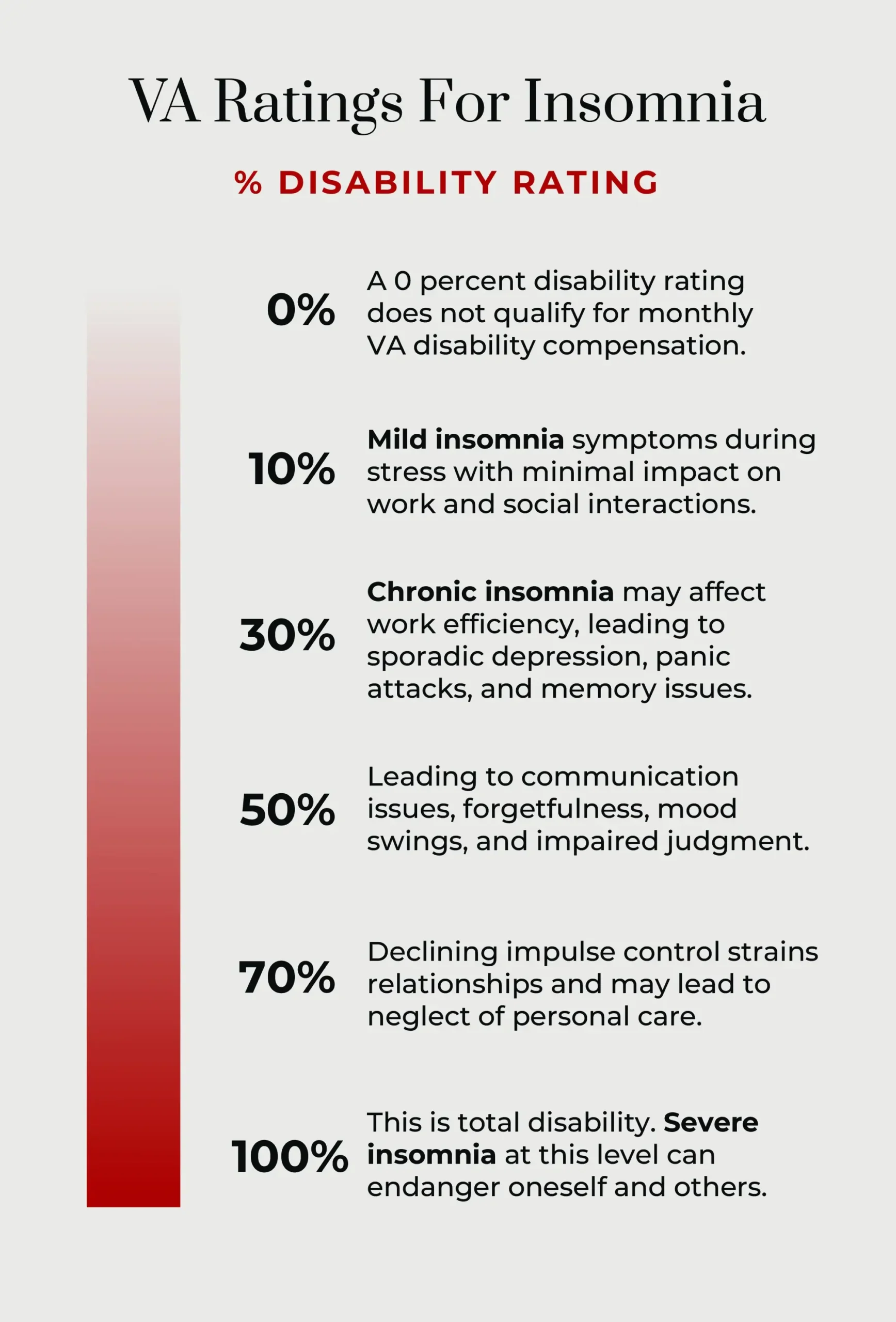Insomnia is a serious condition that can negatively affect your quality of life.
The US Department of Veterans Affairs (the VA) recognizes insomnia as a compensable service-connected disability. If you are experiencing the negative effects of insomnia as a veteran, and you believe that your sleep disorder comes from your military service, the Law Firm of Stone Rose Law has VA disability lawyers who can help you understand the VA benefits you might qualify for and help you to apply for them.
Call us at (480) 498-8998 to speak with a VA lawyer about your options when seeking help with obtaining or appealing your VA rating for insomnia.
In addition to the benefits that all veterans qualify for even at the 0 percent disability rating, the main disability benefit for service-connected insomnia is a monthly disability payment. The amount of this disability benefit changes annually and is based on the same cost-of-living adjustments used for Social Security Income.
You can learn how to estimate your VA disability benefits using our VA Disability Calculator.
You can receive VA disability benefits for insomnia. Like with other disabilities, to qualify for benefits based on an insomnia condition you will need to meet the three basic VA conditions for eligibility:
You meet the first of these conditions by going to your doctor and receiving a medical diagnosis that you suffer from insomnia. The cause of your insomnia can be physical, or mental. Your medical treatment records are important evidence in supporting the existence of your disability benefits claim and its physical or mental origins.
Meeting the second condition––proving the existence of a service connection to your insomnia––depends on the facts of your case. There is more than one way to show a service connection.
For example, a single or series of physical events that happened to you while you were serving could cause your insomnia condition to start. Direct connection insomnia is usually connected with mental disorders.
Other sources of insomnia are secondary and are usually connected with physical origins. A good example of a secondary connection disability is diabetes caused by weight gain – which was the result of taking prescription medication to treat a service-connected pain condition.
Although insomnia can be a secondary connection service-connected disability, it is also a common symptom of other disabilities, like PTSD, anxiety, and depression. Because of this, the VA will often refuse to rate it as a separate disability because it wants to avoid “pyramiding”––that is, receiving disability benefits more than once for the same disability. In this situation, the VA will treat insomnia as an aggravating symptom instead of as a separate disability.
The third condition for VA disability eligibility means that you must still be experiencing some effects from insomnia after you become a veteran. Ongoing records of treatment are one way to prove this. Other ways include showing that your insomnia disability is negatively affecting your life personally, socially, and professionally.

The VA disability ratings for insomnia range from 0 to 100 percent, but insomnia is only eligible for some percentage levels: 0, 10, 30, 50, 70, and 100 percent.
What percent level of disability the VA assigns for insomnia depends on factors including the frequency, severity, and duration of your symptoms.
Monthly compensation: $0.00
This rating means that although you have a diagnosis for insomnia, your symptoms are not so bad that they interfere with your ability to work or function in society.
A 0 percent disability rating does not qualify for monthly VA disability compensation. It is still valuable because with this rating you can still qualify for other VA benefits, including medical treatment, mental health services, and even help securing a VA home loan.
Monthly compensation: $171.23
At this level insomnia symptoms are mild and tend to appear during times when you are under significant stress. Their effects on your ability to work and interact socially are minor. Symptoms that you can control with ongoing use of medications qualify for this rating.
Monthly compensation: $524.31
You reach this level if your insomnia becomes chronic and sometimes causes your work efficiency to drop. At this level, although you can still function normally most of the time, you can also experience occasional feelings of depression or panic attacks. It can also start getting harder to remember things.
Monthly compensation: $1,075.16
Symptoms of insomnia at this level affect you with more regularity and severity than at the 30 percent level. You are now experiencing problems that affect your reliability and productivity at work and your relations with others. It becomes harder to understand and follow complex commands or instructions or to communicate clearly to others. You become absent-minded, moody, and unmotivated. Your judgment skills begin to suffer.
Monthly compensation: $1,716.28
Insomnia at the 70 percent level is a serious condition that interferes with your life in almost all aspects. Your ability to do your job, to learn at school, or to interact with others including your family members all suffer.
You experience everything you would at the 50 percent level, only worse. Your speech can become incoherent. Your feelings of depression become continuous and can turn to frequent panic attacks or thoughts of suicide. Your decreasing ability to control your impulses can make it difficult for your supervisors, coworkers, and family members to deal with you. You might start to neglect caring for your personal appearance and hygiene.
Monthly compensation: $3,737.85
This is also known as a total disability. People who experience insomnia at this level have symptoms so severe that they can be a danger to themselves and others.
They can experience hallucinations and their thinking can become delusional. Their behavior toward others can be extremely inappropriate. Their ability to care for themselves at even basic levels of personal hygiene is sporadic. Their ability to think and to remember can be so degraded that they cannot tell what day or time it is, where they are, whether they have any relatives, or even remember their own names.

If your service-connected insomnia makes it impossible for you to obtain or hold on to substantially gainful employment, then you might qualify for 100 percent disability benefits even if your insomnia rating is less than 100 percent. This is the TDIU benefit.
You can qualify for TDIU in one of two ways: schedular TDIU, and extra-schedular TDIU.
You can qualify for schedular TDIU if, in addition to being unable to obtain or keep substantially gainful employment, you meet one of two additional requirements:
The VA recognizes that in some situations, which it will consider on a case-by-case basis, you can still be eligible for TDIU even if you do not qualify for benefits under the schedular TDIU requirements because of disability symptoms that the schedular TDIU method does not adequately account for.
Note that TDIU does not mean that you cannot work at all. You can still receive TDIU and engage in what the VA calls “marginal employment.”
In some cases when you are receiving total disability benefits for insomnia, you can also qualify for additional special monthly compensation. Either or both of the following must be true to qualify for this additional benefit:
At Stone Rose Law, we are VA disability advocates for veterans’ disability claims. We are board-certified VA claims lawyers who serve on behalf of veterans nationwide. Our VA-accredited attorneys give you affordable, high-quality veterans appeals legal assistance.
Our team of dedicated VA disability attorneys at Stone Rose Law has the knowledge and experience to help you with your VA disability claim. Whether it is an initial application for benefits or appealing a claim denial, our attorneys are ready to help you obtain the disability benefits you earned.
A Stone Rose Law VA disability lawyer can help you prepare your disability claim, monitor your claim status, and consult with you before disability examinations — all at no cost to you.
If the VA denies your original insomnia disability claim, our VA benefits law firm will assign a VA disability appeals lawyer to help you pursue a VA appeal with the Board of Veterans Appeals while providing free representation on a contingency fee basis.
This means you won’t pay your VA disability lawyer any fees unless we win your appeal. For more information about how one of our VA disability lawyers can help you with your VA disability compensation claim or appeal, request a free assistance consultation at (480) 498-8998. Or, if you prefer, you can reach us online to ask a question about veterans’ law, veterans’ disability benefits, or to set an appointment with one of our veterans lawyers for a free case evaluation.